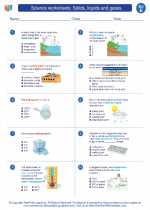Civil Engineering
Civil engineering is a branch of engineering that deals with the design, construction, and maintenance of the physical and naturally built environment. Civil engineers are involved in the design and construction of various structures, including buildings, bridges, roads, dams, and other infrastructure projects.
Key Concepts to Study
- Structural Engineering: Study of the design and construction of structures to withstand various forces and loads.
- Geotechnical Engineering: Focuses on the behavior of earth materials and the design of foundations for structures.
- Transportation Engineering: Involves the design and maintenance of transportation systems such as roads, highways, and airports.
- Hydraulic Engineering: Deals with the management of water resources and the design of hydraulic structures such as dams and channels.
- Construction Engineering: Focuses on the management and construction of infrastructure projects.
- Environmental Engineering: Involves the application of engineering principles to improve and maintain the environment.
Study Tips
Here are some tips for studying civil engineering:
- Understand the Basics: Start by understanding the fundamental principles of physics, mathematics, and materials science.
- Practice Problem-Solving: Civil engineering involves a lot of problem-solving, so practice solving engineering problems and equations.
- Stay Updated: Keep up with the latest developments and technologies in the field of civil engineering.
- Use Resources: Utilize textbooks, online resources, and reference materials to expand your knowledge.
- Work on Projects: Get involved in practical projects and internships to gain hands-on experience.
Career Opportunities
Civil engineering offers a wide range of career opportunities, including:
- Structural Engineer
- Transportation Engineer
- Geotechnical Engineer
- Environmental Engineer
- Construction Project Manager
- Urban Planning Consultant
By studying civil engineering, you will gain a deep understanding of the principles and practices involved in creating and maintaining the infrastructure that supports modern society.
.◂Science Worksheets and Study Guides Fifth Grade. Science worksheets: Solids, liquids and gases.
Study Guide Solids, liquids and gases
Solids, liquids and gases  Worksheet/Answer key
Worksheet/Answer key Solids, liquids and gases
Solids, liquids and gases  Worksheet/Answer key
Worksheet/Answer key Solids, liquids and gases
Solids, liquids and gases  Worksheet/Answer key
Worksheet/Answer key Solids, liquids and gases
Solids, liquids and gases  Vocabulary/Answer key
Vocabulary/Answer key Solids, liquids and gases
Solids, liquids and gases 

 Worksheet/Answer key
Worksheet/Answer key
 Worksheet/Answer key
Worksheet/Answer key
 Worksheet/Answer key
Worksheet/Answer key
 Vocabulary/Answer key
Vocabulary/Answer key

The resources above cover the following skills:
PHYSICAL SCIENCE (NGSS)
Matter and Its Interactions
Students who demonstrate understanding can:
Make observations and measurements to identify materials based on their properties.